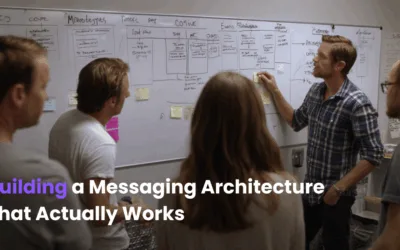The best way to become aware of what’s possible is through innovation. Even in the face of the kind of disruption that Covid-19 has presented to business, innovation helps build organisational practice to weather the storm of change.
Profound change and how innovation can help
Over the past several weeks we’ve been sharing posts about what we see as the mindSHIFT taking place since the pandemic. In essence, we’ve seen a change in business practice that is so profound, it requires companies to think differently about the way they operate.
There are three profound changes we’ve identified:
- Dramatic drop in the percentage of workers operating within offices or at workplace locations full time, to be sustained beyond the pandemic;
- Increased reliance on technology to facilitate remote work and increased pressure on systems to support remote participation and collaboration;
- Increased need for infrastructure and skills to support productivity in hybrid workplaces.
What we’ve demonstrated in our work on mindSHIFT, is that these profound changes have already happened. What we’ve observed is that many, if not most businesses still haven’t come to grips with how they are going to adapt to a hybrid workplace.
Innovation can help in each of these domains, and can help deliver a more effective hybrid workplace.

Facing disruption without innovation
But it’s all very well for me to say that you need innovation to change effectively. What happens if an organisation decides to just hope for the best? What happens when you face disruption without innovation?
If an organisation attempts to weather disruption without innovation, they risk being unaware of what’s possible. They may not know where to focus their attention to support the change that’s happening around them. And perhaps most importantly of all, they may miss out on opportunities to sustain or even grow their business when disruption inevitably arises.
For instance, an organisation may have adopted virtual conferencing systems when everyone was working from home during the pandemic. But they may not have thought through how that’s going to be sustained after people come back to the office. They haven’t examined the issues of employee experience in a hybrid workplace. They haven’t considered how consumer expectations may have changed. Perhaps they have jumped to off-the-shelf solutions to support their immediate needs, without focusing on their medium-long term objectives.
This is a very high risk approach to disruption. And it’s going to cost a lot down the track.
Plan ahead
It’s often said that in periods of economic uncertainty, enterprises cut their innovation budgets. And there’s so much wrong with that truism it’s frightening. In such times, innovation can be the driving force in cost savings, as well as in development of value added products and services. But leaving that opportunity aside for now, when we are in the thick of significant change, innovation is absolutely vital to address new challenges arising from that change.
You need to project ahead. You need to gather ideas from within and beyond your firm, and you need to validate, prototype and test those ideas. Only then will you be sure you’ve made the right decisions for your business, and aligned them with your strategic objectives.
This is the innovation process, and when it is done with the right tools and the right people, it helps create a buffer against rising costs from disruption. It can also build capability within your teams, and develop resilience against further disruption.
When you use innovation to support disruption, you can get long term, sustainable benefits.



